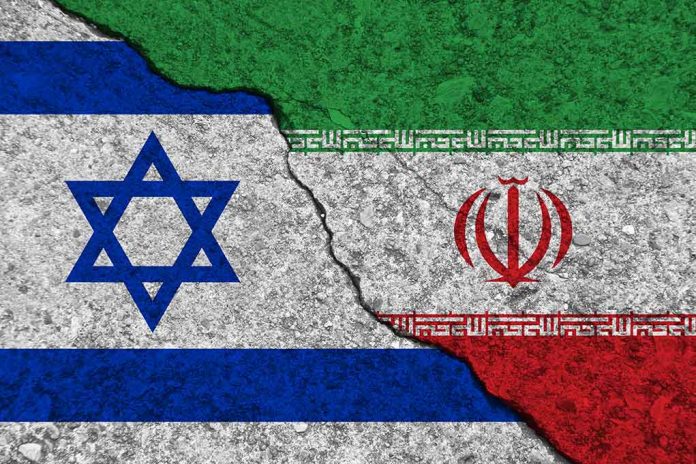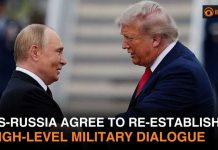
President Trump faces a pivotal challenge as MAGA voices fiercely oppose U.S. involvement in escalating Israel-Iran tensions, despite Israel’s recent airstrikes potentially drawing America into another Middle Eastern conflict.
Key Takeaways
- Prominent MAGA figures including Tucker Carlson, Steve Bannon, and Charlie Kirk strongly oppose U.S. intervention in the Israel-Iran conflict, emphasizing “America First” priorities
- The U.S. military is already assisting Israel by intercepting Iranian missiles and increasing military presence in the region, raising concerns about deeper involvement
- President Trump, who campaigned on ending “endless wars,” now faces pressure from both anti-war supporters and pro-Israel hawks within his base
- Republican lawmakers like Rand Paul and Thomas Massie advocate for diplomatic solutions, contrasting with hawkish figures like Lindsey Graham who support Israeli military actions
- War-weary Americans across political lines are increasingly concerned about potential U.S. entanglement in another Middle Eastern conflict
MAGA Leaders Push “America First” Over Middle East Intervention
As tensions between Israel and Iran reach dangerous levels following recent military exchanges, influential voices within President Trump’s base are sounding the alarm about potential U.S. involvement. MAGA figures who played crucial roles in Trump’s political rise have been unequivocal in their opposition to American intervention. Charlie Kirk, founder of Turning Point USA, expressed the sentiment clearly when he stated, “I can tell you right now, our MAGA base does not want war,” emphasizing the strong anti-war position among Trump supporters who prioritize domestic concerns over foreign entanglements.
Steve Bannon, Trump’s former chief strategist, articulated the distinction between supporting Israel and committing American resources: “We don’t oppose Israel being Israel first. We get it. They should be Israel first. But we have to be America first. The bottom line is we cannot be dragged into a war on the Eurasian landmass in the Middle East,” Bannon warned. This position reflects growing concern among conservatives that America’s national interests could be sacrificed in service of another nation’s security objectives.
Tucker Carlson Warns of Warmongering Influences
Perhaps no voice has been more influential in challenging the pro-war narrative than Tucker Carlson, who has consistently criticized those pushing for U.S. military involvement. Carlson delivered a scathing assessment of figures pressuring Trump toward intervention: “The real divide isn’t between people who support Israel and people who support Iran or the Palestinians. The real divide is between those who casually encourage violence, and those who seek to prevent it — between warmongers and peacemakers.” He specifically named several influential pro-Israel figures, including prominent media personalities, who he believes are pushing for American military action.
“What happens next will define Donald Trump’s presidency,” said Tucker Carlson.
The situation presents a complex balancing act for President Trump, who must navigate between competing influences within his support base. Trump has sent mixed signals regarding Iran, initially extending diplomatic overtures while later adopting tougher rhetoric about Tehran’s nuclear ambitions. This ambiguity reflects the tension between Trump’s campaign promises to avoid foreign entanglements and pressure from pro-Israel supporters who advocate for a strong stance against Iran.
Congressional Voices Echo Anti-War Sentiment
The divide over U.S. involvement extends to Congress, where libertarian-leaning Republicans have joined the chorus against intervention. Senator Rand Paul and Representative Thomas Massie have consistently advocated for diplomatic solutions rather than military escalation. Their position stands in stark contrast to hawks like Senator Lindsey Graham, who has been supportive of Israel’s aggressive military posture toward Iran. This split reflects broader tensions within the Republican Party about America’s proper role in international conflicts.
“Our focus must not be on seeking regime change or any further escalation of America’s involvement. The last thing America needs right now is a new war. Our number one desire must be peace, as quickly as possible,” said Charlie Kirk.
The U.S. military’s current level of involvement already raises questions about America’s trajectory in the conflict. American forces have assisted in intercepting Iranian missiles aimed at Israel and have increased their presence in the region, with naval assets being repositioned to support potential operations. These developments concern those who see them as preliminary steps toward deeper military entanglement that could eventually lead to direct conflict with Iran.
Divided Base Presents Challenge for Trump’s Foreign Policy
President Trump’s handling of this situation will likely prove consequential for both his presidency and America’s role in the Middle East. Trump campaigned successfully on an “America First” platform that resonated with voters weary of costly foreign interventions. However, his administration also included figures like John Bolton and Mike Pompeo, who advocated for strong measures against Iran during his first term. This internal tension reflects the broader division within his support base between traditional hawkish conservatives and the newer anti-interventionist MAGA movement.
“Last night was a decapitation strike against the Iranian Revolutionary Guard. And hey, you’re putting your defense first and that’s fine. But we gotta put our defense first. And what cannot happen is be drawn into another war,” said Steven Bannon.
The debate over American involvement in the Israel-Iran conflict transcends traditional political boundaries. While many MAGA voices oppose intervention for reasons of national interest and war fatigue, some progressive Democrats oppose it based on criticisms of Israeli policies. What unites these disparate views is a shared concern that America cannot afford—financially, militarily, or morally—to become entangled in another protracted Middle Eastern conflict with unpredictable consequences and no clear exit strategy.













